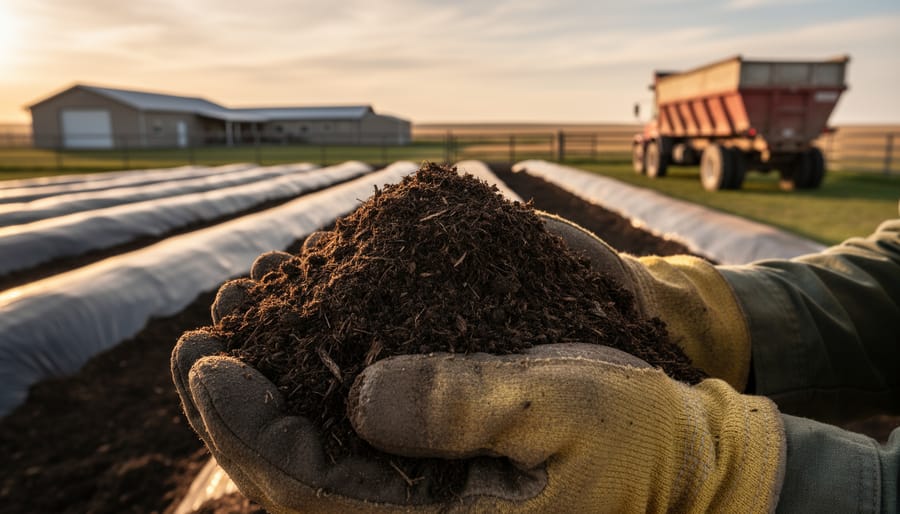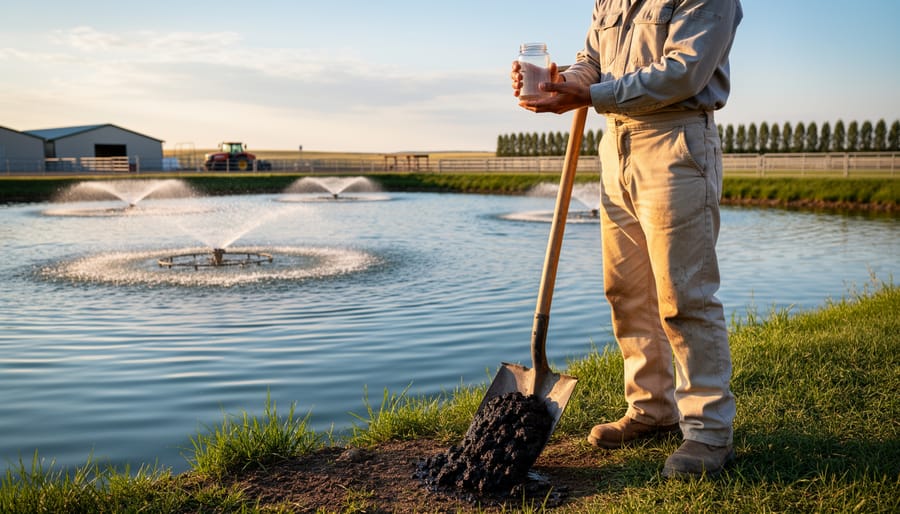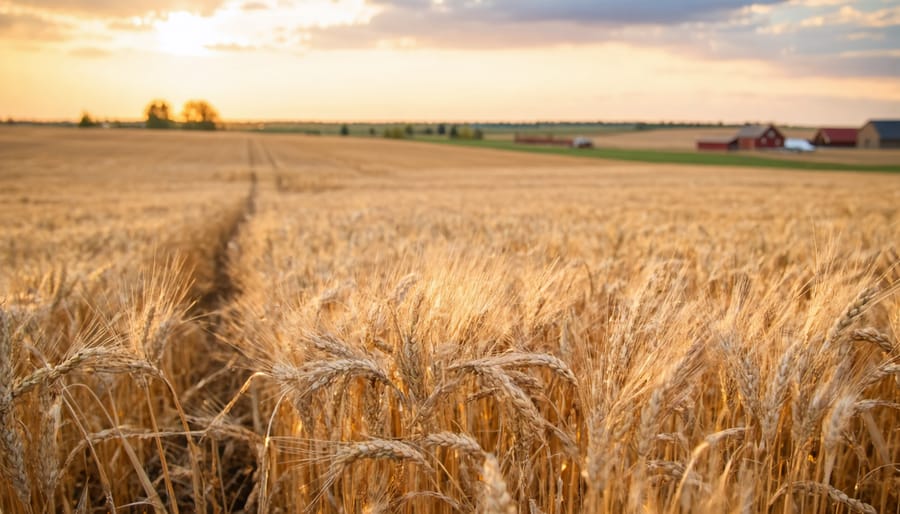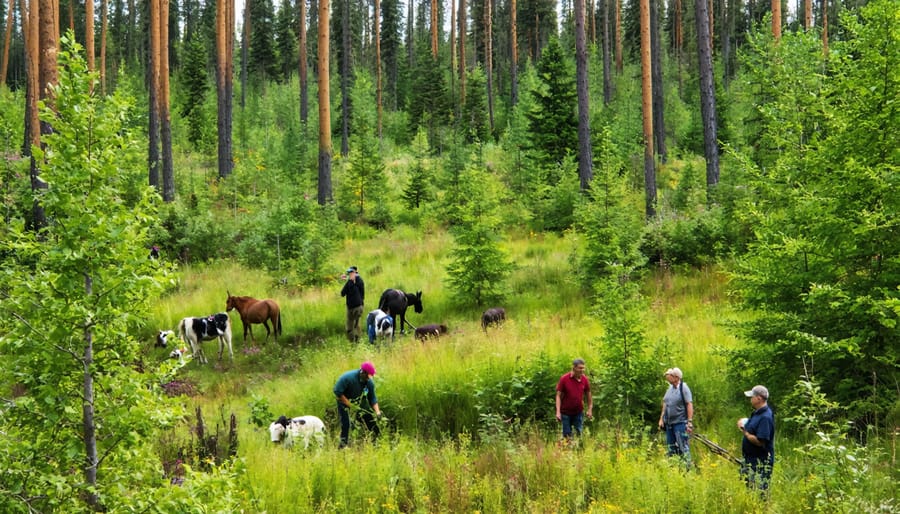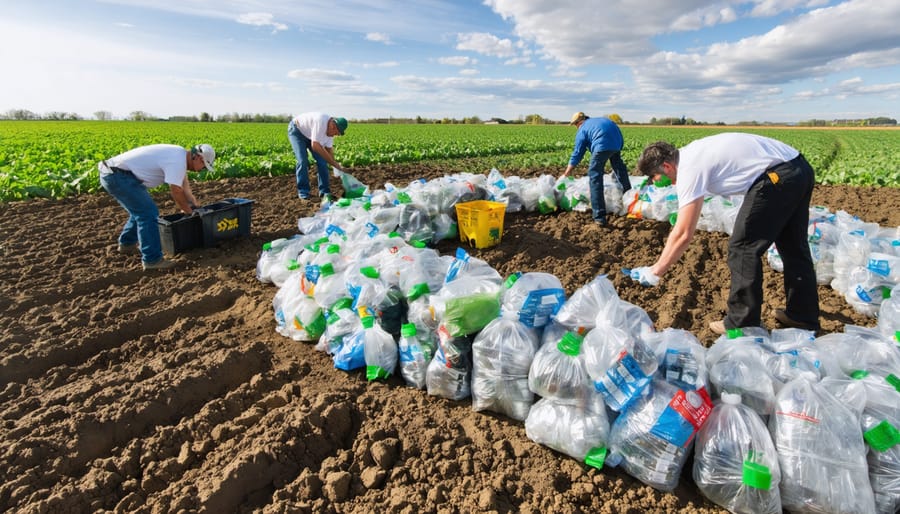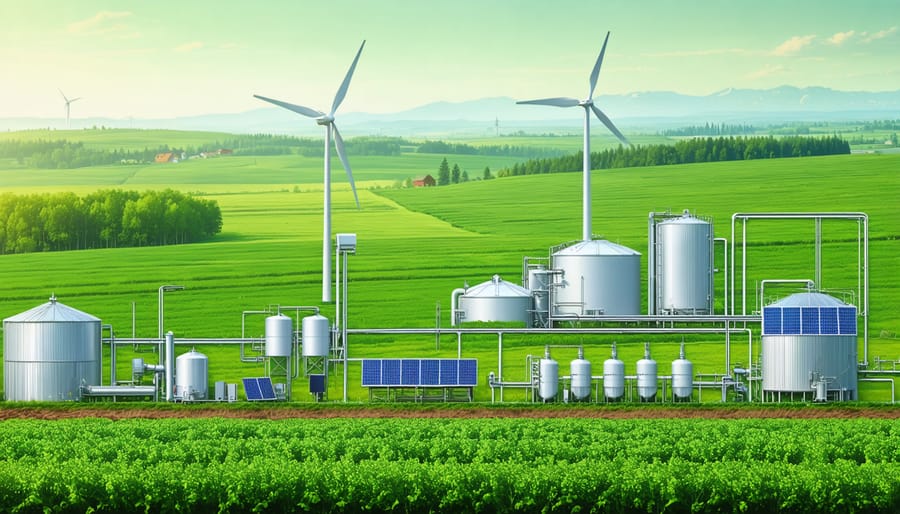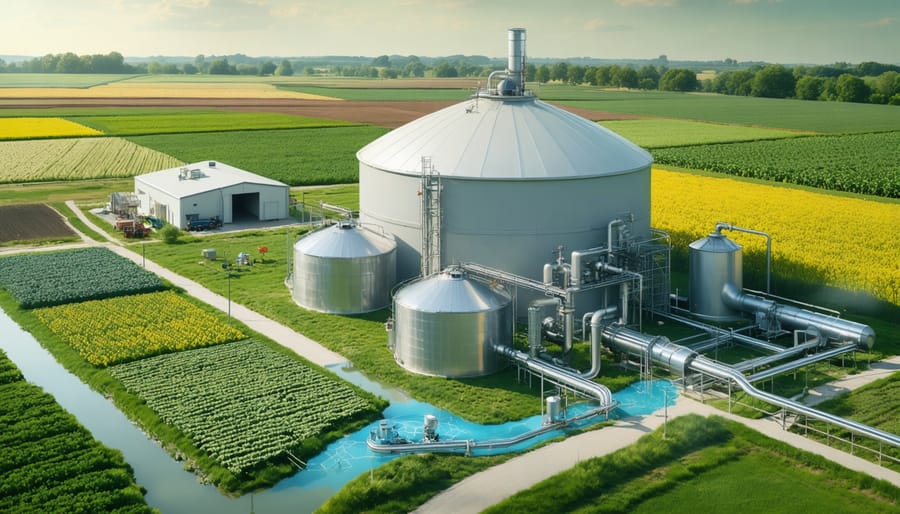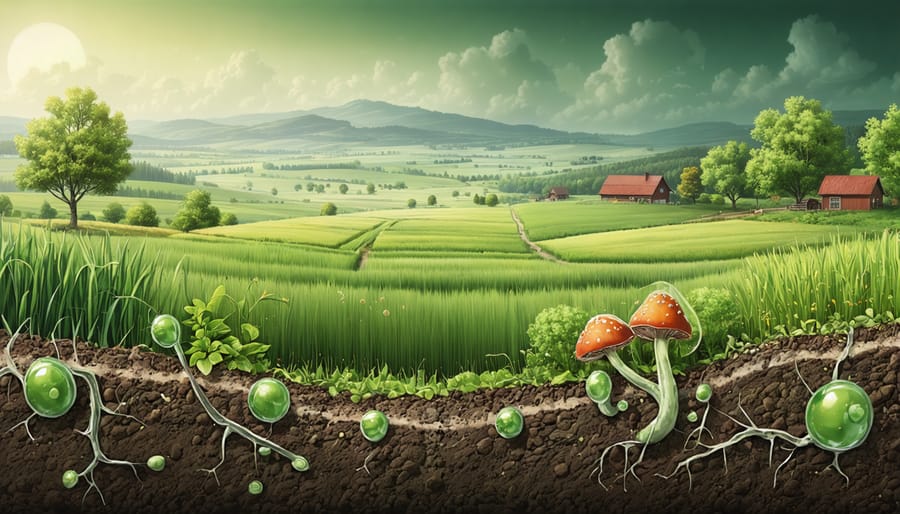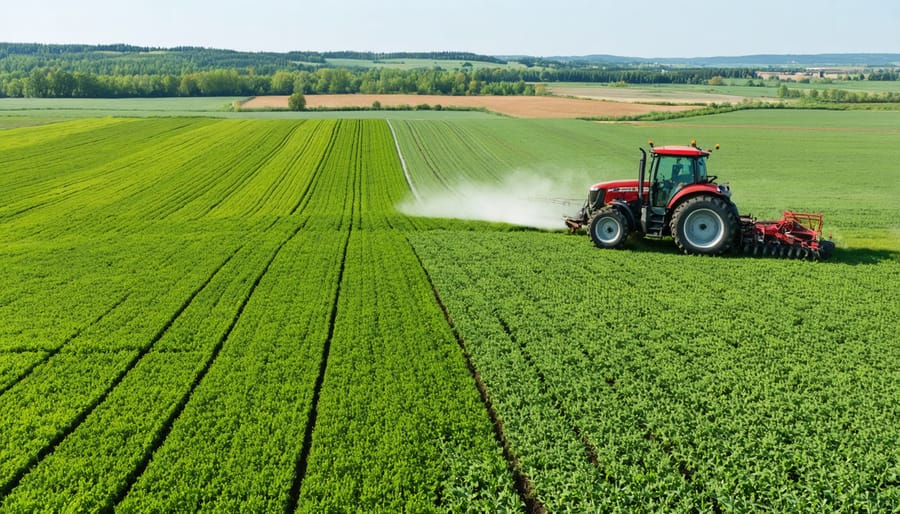Transforming farm waste into valuable resources drives the future of Canadian agriculture. Across Alberta’s fertile plains, innovative organic recycling programs are revolutionizing how we manage agricultural byproducts, turning yesterday’s waste into tomorrow’s profit. Modern composting technologies now convert livestock manure, crop residues, and food processing waste into premium soil amendments, reducing landfill burden while building soil health and farm resilience.
For Canadian farmers, organic recycling represents more than environmental stewardship—it’s a practical solution to rising input costs and increasing regulatory pressures. With processing capabilities ranging from small on-farm systems to industrial-scale facilities, organic recycling adapts to operations of any size. Local success stories, like the Lethbridge Biogas facility converting 120,000 tonnes of organic waste annually into renewable energy and nutrient-rich fertilizer, demonstrate the tangible benefits of embracing these practices.
This sustainable approach not only reduces greenhouse gas emissions and water pollution but also creates new revenue streams through marketable compost products and carbon credits. As climate-smart agriculture gains momentum, organic recycling positions Canadian farms at the forefront of sustainable food production while strengthening local agricultural communities.
Modern Organic Waste Processing Technologies
Automated Composting Systems
Modern automated composting systems have revolutionized how Alberta farmers can effectively turn farm scraps into black gold. These systems range from in-vessel composters to automated windrow turners, making organic waste management more efficient and less labour-intensive.
For small to medium-sized operations, drum composters are gaining popularity. These rotating vessels can process up to 2,000 kg of organic material weekly, maintaining optimal moisture and oxygen levels while protecting compost from harsh Alberta winters. Temperature sensors and automated moisture control systems ensure consistent decomposition throughout the year.
Larger operations often benefit from automated windrow systems equipped with GPS-guided turners. These machines can manage windrows up to 100 metres long, automatically adjusting turning frequency based on temperature and moisture readings. Many Alberta farmers have reported significant labour savings, with some systems reducing manual intervention by up to 75%.
Advanced monitoring systems now allow farmers to track composting progress through smartphone apps, providing real-time data on temperature, moisture, and oxygen levels. These smart systems can even predict when the compost will be ready for use, helping farmers plan their soil amendment schedules more effectively.
To maximize efficiency, many systems now incorporate automated screening and sorting mechanisms, ensuring the final product meets the high standards required for organic farming certification in Canada.
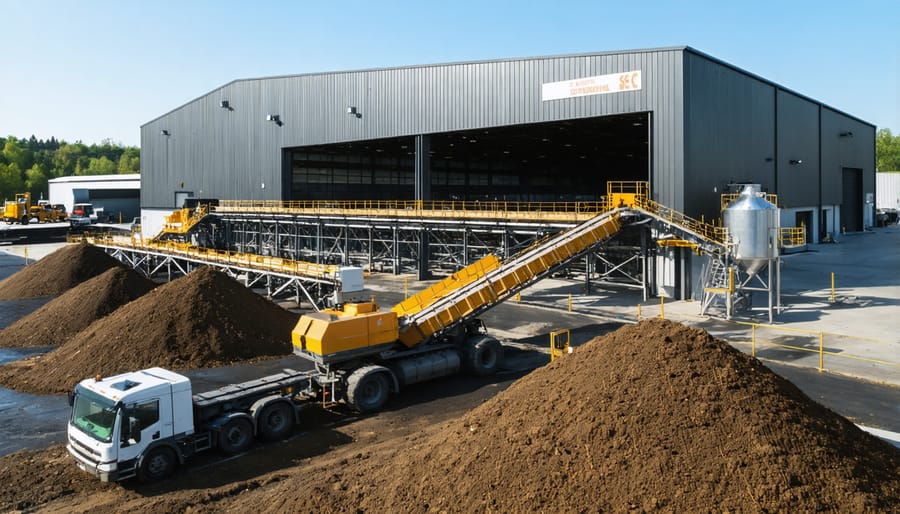
Anaerobic Digestion Solutions
Anaerobic digestion offers Alberta farmers a powerful solution for converting organic waste into valuable resources. Through this process, microorganisms break down organic materials like manure, crop residues, and food waste in oxygen-free environments, producing biogas and nutrient-rich digestate.
The biogas generated typically contains 60% methane and can be used directly for heating or converted into electricity using specialized generators. Many Alberta farmers are now powering their operations with this renewable energy source, significantly reducing their utility costs and carbon footprint.
The digestate, a beneficial by-product, serves as an excellent organic fertilizer. It contains readily available nutrients like nitrogen, phosphorus, and potassium, which can be applied directly to crops. According to research from the University of Alberta, farms using digestate have reported up to 25% improvement in soil fertility compared to traditional fertilizers.
Modern anaerobic digestion systems come in various sizes to suit different farm operations. Small-scale systems processing 10-50 tonnes of waste annually work well for family farms, while larger operations might opt for systems handling 500+ tonnes per year. Local success stories include the Lethbridge Biogas facility, which processes over 120,000 tonnes of organic waste annually while generating enough electricity to power 2,800 homes.
To maximize efficiency, many farmers are now implementing automated feeding systems and temperature controls. These improvements have made biogas production more reliable and manageable, even during Alberta’s harsh winters.
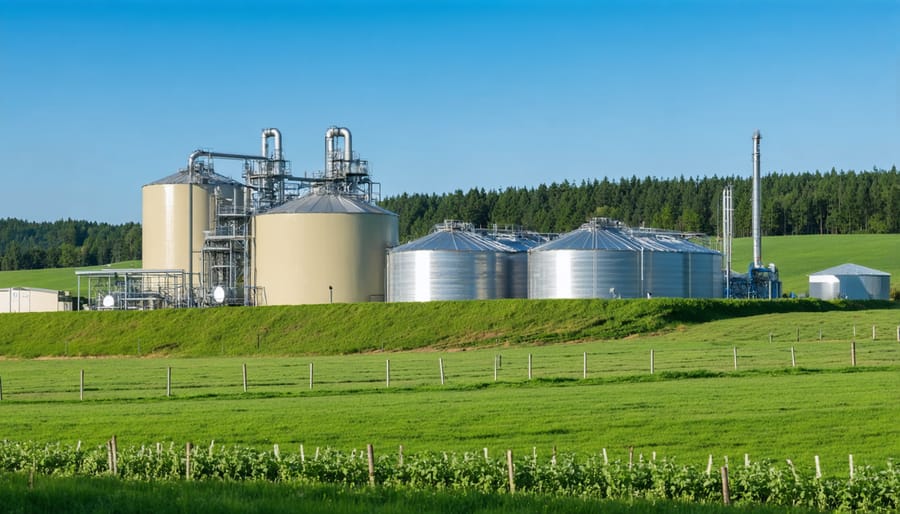
Alberta Success Stories: Farms Leading the Way
The Miller Farm Revolution
Located just outside of Lacombe, Alberta, the Miller Family Dairy Farm has become a shining example of successful organic waste management in Canadian agriculture. In 2018, John and Sarah Miller transformed their traditional 200-head dairy operation into a closed-loop system that now generates zero waste.
The Millers installed an advanced anaerobic digestion system that processes approximately 30 tonnes of manure daily, converting it into biogas for electricity generation and high-quality organic fertilizer. The system also handles food waste from local restaurants and expired produce from nearby grocery stores, creating additional revenue streams for the farm.
“We used to spend $45,000 annually on waste management and fertilizer costs,” explains John Miller. “Now, we’re actually earning from our waste while reducing our carbon footprint.” The farm generates enough electricity to power their entire operation and sells surplus energy back to the grid, earning an additional $30,000 annually.
The fertilizer byproduct has improved soil health across their 400 hectares of cropland, resulting in a 25% increase in yield over three years. The Millers also report significant reduction in odour complaints from neighbouring properties, strengthening community relationships.
The farm regularly hosts tours for local farmers interested in implementing similar systems, demonstrating that with proper planning and implementation, waste management can evolve from a cost center into a profitable venture.
Red Deer Valley Organics
Located just outside of Red Deer, Alberta, the Thompson family’s organic vegetable operation has revolutionized their approach to waste management through an innovative composting system that’s garnering attention across the province. The 40-hectare farm processes over 500 tonnes of organic waste annually, transforming vegetable scraps, crop residues, and local yard waste into nutrient-rich compost.
The system, implemented in 2019, features a three-bin rotation method with temperature-controlled compartments. Each bin measures 4 meters by 6 meters, allowing for optimal batch sizing and efficient decomposition. “We maintain temperatures between 55°C and 65°C, which eliminates pathogens while preserving beneficial microorganisms,” explains Sarah Thompson, the farm’s operations manager.
What sets their system apart is the integration of smart monitoring technology. Sensors track moisture levels and temperature, sending real-time data to the Thompsons’ smartphones. This precision allows them to maintain ideal composting conditions while reducing labor costs by 40%.
The farm partners with local restaurants and grocery stores, collecting their organic waste weekly. This partnership not only provides free composting materials but has also strengthened community ties. The resulting compost has improved soil structure across their fields, leading to a 25% increase in vegetable yields over the past three years.
“It’s about closing the loop,” Sarah notes. “We’re not just managing waste; we’re creating a valuable resource that enhances our soil health and produces better food for our community.”
Implementation Guide for Your Farm
Assessment and Planning
Before implementing any organic recycling program, it’s crucial to conduct a thorough assessment of your farm’s waste streams. Start by tracking your organic materials over several seasons, including crop residues, animal manure, and food processing byproducts. Keep detailed records of volumes, seasonal variations, and current disposal methods.
Consider conducting a waste audit during peak production periods. This involves collecting and categorizing waste materials to identify opportunities for recycling and composting. Many Alberta farmers have found success with proven composting systems that match their specific waste profiles.
When planning your organic recycling strategy, factor in:
– Available space for processing and storage
– Equipment and labour resources
– Seasonal weather patterns
– End-product requirements
– Local regulations and permits
Work with local agricultural extension services to evaluate different processing methods. They can help determine whether windrow composting, in-vessel systems, or other solutions best suit your operation. Consider forming partnerships with neighboring farms to share resources and maximize efficiency.
Set realistic implementation timelines and establish clear metrics for success. These might include waste diversion rates, cost savings, or soil quality improvements. Regular monitoring and adjustment of your plan ensures long-term sustainability and optimal results.
Available Grants and Support
Several funding opportunities are available to support organic waste management initiatives in Canada. The Canadian Agricultural Partnership (CAP) offers grants of up to $250,000 for implementing innovative waste management solutions on farms. In Alberta, the Environmental Stewardship and Climate Change Producer Program provides cost-sharing opportunities covering up to 70% of eligible expenses for organic recycling projects.
The Agricultural Clean Technology Program, administered by Agriculture and Agri-Food Canada, offers funding specifically for sustainable farming practices, including organic waste management systems. Farmers can receive between $50,000 to $2 million for qualifying projects.
Alberta’s Agricultural Production Enhancement Program supports farmers with grants ranging from $10,000 to $100,000 for implementing composting systems and other organic waste management solutions. The program particularly encourages collaborative projects between neighboring farms.
Local municipalities often provide additional support through equipment-sharing programs and technical assistance. The Alberta Farm Waste Management Program offers free consultations with waste management specialists who can help develop customized solutions for your operation.
For smaller operations, the Farm Energy and Agri-Processing Program provides micro-grants of up to $25,000 for implementing waste-to-energy projects. Remember to check application deadlines and eligibility criteria, as these programs are updated annually. Your local agricultural fieldman can help navigate these opportunities and assist with the application process.
Regulatory Compliance
In Alberta, organic recycling operations must comply with the Environmental Protection and Enhancement Act (EPEA) and the Agricultural Operation Practices Act (AOPA). Farmers implementing organic recycling systems need to obtain necessary permits from their local municipality and the Natural Resources Conservation Board (NRCB) if processing more than 500 tonnes annually.
Key certification requirements include maintaining detailed records of incoming materials, processing temperatures, and final product testing. The Compost Quality Alliance (CQA) program, supported by the Compost Council of Canada, provides voluntary standards that many successful operations follow to ensure product quality and market access.
For on-farm composting, operators must follow specific setback distances from water bodies and neighboring properties. Temperature monitoring is mandatory, with compost piles required to maintain 55°C for at least 15 consecutive days to ensure pathogen reduction.
Alberta Environment and Parks conducts regular inspections of larger facilities, while smaller operations may fall under municipal oversight. Farmers should maintain open communication with their local agricultural fieldman, who can provide guidance on compliance requirements and best practices.
Remember that regulations may vary by municipality, so it’s essential to consult with local authorities before starting any organic recycling operation. The Alberta Farm Fresh Producers Association offers valuable resources and networking opportunities to help farmers navigate these requirements effectively.
Environmental and Economic Benefits
Carbon Footprint Reduction
Implementing organic recycling practices in waste management significantly reduces greenhouse gas emissions on Canadian farms. Studies from Alberta Agriculture show that proper organic waste recycling can decrease methane emissions by up to 60% compared to traditional disposal methods. Beyond emissions reduction, these carbon cycle farming benefits include improved soil structure and enhanced carbon sequestration capacity. Recent field trials in central Alberta demonstrated that farms utilizing organic recycling systems increased their soil organic carbon levels by 2-3% over five years, while simultaneously reducing their carbon footprint by an average of 4.5 tonnes CO2 equivalent per hectare annually. The improved soil quality also showed a 25% increase in water retention capacity and a 40% reduction in synthetic fertilizer requirements, creating a positive feedback loop that further reduces emissions while enhancing farm productivity.
Financial Returns
Implementing organic waste management systems can generate significant financial returns for Canadian farms. A typical 500-hectare farm can save $15,000 to $20,000 annually on fertilizer costs through composting and proper organic waste utilization. Many Alberta farmers report reducing their chemical fertilizer purchases by up to 40% after implementing organic recycling programs.
Revenue opportunities include selling excess compost to local gardeners and landscapers, with premium compost fetching $45-60 per cubic metre in the Canadian market. Some innovative farms have partnered with local restaurants and food processors to accept their organic waste, creating additional income streams of $500-1,000 monthly through tipping fees.
Consider the experience of Red Deer Valley Farms, which recovered their initial $25,000 investment in composting equipment within two years through reduced input costs and compost sales. Government grants and environmental incentives can further improve the financial outlook, with programs offering up to 50% cost-sharing for implementing sustainable waste management systems.
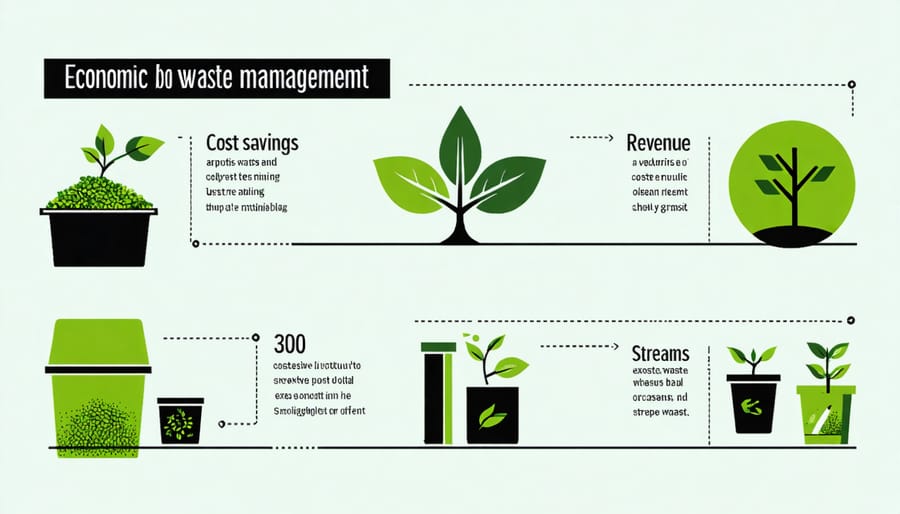
As we’ve explored throughout this article, organic waste management presents a significant opportunity for Alberta’s agricultural community to enhance soil health, reduce environmental impact, and improve farm profitability. By implementing these recycling practices, you’re not just managing waste – you’re investing in your land’s future productivity and contributing to Canada’s sustainable agriculture goals.
Whether you’re starting with simple composting or ready to explore advanced anaerobic digestion systems, every step toward better organic waste management counts. The success stories we’ve shared from fellow Alberta farmers demonstrate that these practices are both practical and profitable in our unique climate and farming conditions.
We encourage you to take action today. Start by assessing your current waste streams and identifying one area where you can implement organic recycling. Connect with local agricultural extension offices, join farmer-led waste management initiatives, or reach out to neighbouring farms that have successfully implemented these systems.
Remember, sustainable waste management isn’t just about environmental stewardship – it’s about building resilient farm operations for generations to come. Together, we can transform organic waste from a challenge into an opportunity for growth and innovation in Alberta’s agricultural sector.


